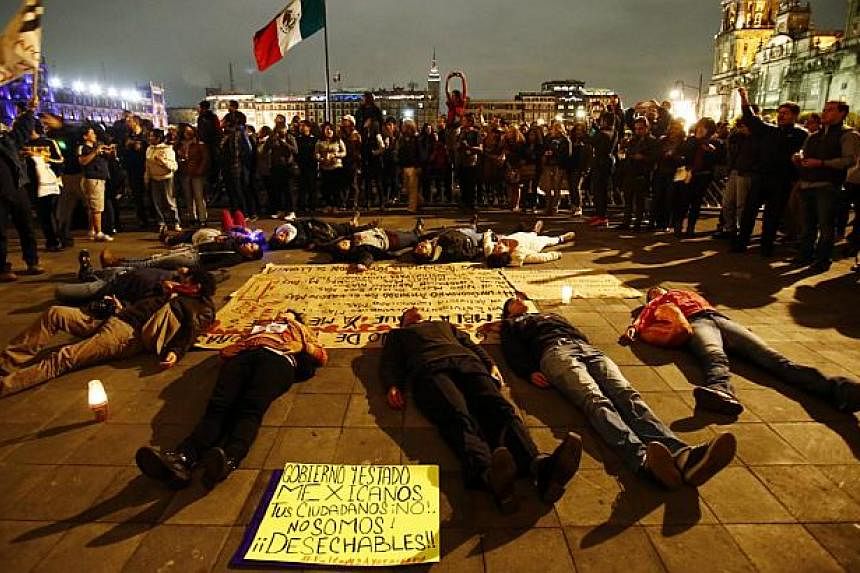MEXICO CITY (AFP) - Eleven beheaded bodies were found Thursday in Mexico's troubled southern state of Guerrero, a region still reeling from the apparent massacre of 43 students.
The grisly discovery came as President Enrique Pena Nieto prepared to unveil a new security strategy in response to a wave of protests that erupted after a police-backed gang confessed to killing the 43 students.
In the latest carnage to hit Guerrero, 11 bodies were dumped on a road near the town of Chilapa following reports of a shootout, state and municipal officials said.
"In addition to being executed, the 11 people were decapitated and subsequently some were burned," said a state government official who requested anonymity.
A note was left near the bodies with a message addressed to the criminal group "Los Ardillos" (The Squirrels), with the words "here's your trash," the official said.
A state police officer said the bodies had high-calibre bullet wounds.
The victims appeared to be in their 20s.
Chilapa is 40km east of Ayotzinapa, where the teacher-training college of the 43 students is located.
'TURNING POINT'
Authorities say the aspiring teachers, all young men, were rounded up by municipal police in the city of Iguala on Sept 26.
The case has become a tragic example of collusion between local authorities and organised crime in Mexico, a country struggling with drug violence that has left 100,000 people dead or missing since 2006.
On the eve of his announcement, Pena Nieto said the Iguala case was a "turning point for the nation".
"It is only a constructive, positive attitude that will allow us, society and government, to build the Mexico that we want and that we want to project to the entire world," he said.
Pena Nieto is expected to push for passage of dormant anti-corruption legislation and announce an overhaul of the country's municipal police forces.
Prosecutors say Iguala's mayor ordered his police force to confront a group of students over fears they would disrupt a speech by his wife.
Guerreros Unidos gang henchmen confessed to killing the students and incinerating their bodies after officers turned them over.
POLICE FAIL 'TRUST TESTS'
Pena Nieto will not be the first Mexican president to seek to reform the police.
Some 400,000 federal, state and municipal police forces across the country have undergone anti-corruption exams with polygraph tests, a system that began under his predecessor, Felipe Calderon.
The interior ministry said this month that 13 per cent of municipal officers failed the exam, compared to 10 per cent of state and 6 per cent of federal forces.
The non-government organisation Common Cause said this week that 42,214 federal, state and municipal police staff are still working despite failing the "control de confianza" (trust test).
"We have made it clear to governors... that they must remove them from their positions," Interior Minister Miguel Angel Osorio Chong.
"None of them can be in the streets today, in any state, in any town."
When he took office in December 2012, Pena Nieto vowed to reduce the everyday violence besetting the country.
But he maintained the controversial militarised strategy of Calderon, who deployed 50,000 troops against the drug cartels in 2006.
Pena Nieto launched a crime prevention programme, which officials acknowledged will take years to show results, and created a 5,000-strong militarised police force, the gendarmerie.
In an editorial, the national daily El Universal noted that past governments launched anti-crime measures in response to public discontent, with some positive results.
"But the depth of the problem is so large that these actions have not changed an indisputable fact in the perception of people, that crime continues to grow," it said.
"This time, the State's response will have to be stronger."

